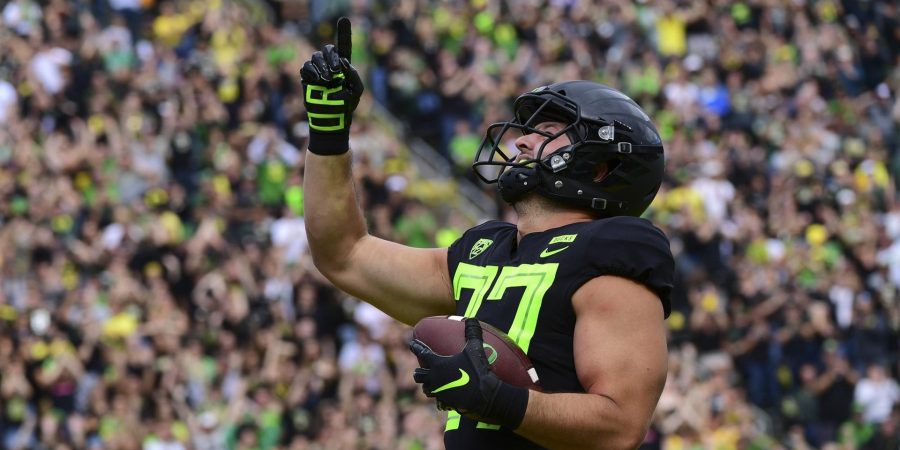For a second consecutive week, the Ducks have suffered a season-ending injury to a key senior contributor.
A week ago vs. Cal, senior defensive end Gus Cumberlander sustained a season-ending knee injury in the fourth quarter of Oregon’s 17-7 win over the Bears, effectively ending his career as a Duck. This week, the injury bug claimed senior tight end Jacob Breeland, who went down with an apparent leg injury in the first quarter of Oregon’s 45-3 dismantling of Colorado this past Friday. Similar to Cumberlander, Breeland’s injury will end his football career at Oregon, Ducks head coach Mario Cristobal confirmed Monday.
It’s another bitter end to what was unfolding as a breakout season for the veteran pass catcher. Like Cumberlander, Breeland was playing some of the best football of his career prior to the injury. Unlike Cumberlander, however, the Ducks are far less equipped at tight end compared to the defensive line to absorb the extended absence of Breeland.
Through six games, Breeland leads the Ducks in both receiving yards (405) and receiving touchdowns (6), and is tied for the team lead in receptions (26) serving as Justin Herbert’s preferred target through the air. His absence moving forward leaves Herbert without a proven go-to target who was gathering momentum as one of the top draft-eligible prospects at tight end heading into the 2020 NFL draft.
Now Herbert and the Ducks must find a player (or players) who can help fill that void.

At tight end, the options are limited. With redshirt junior Cam McCormick having been ruled out for the year with an ankle injury, senior walk-on Ryan Bay and redshirt junior Hunter Kampmoyer are the safest bets to see their roles expanded with Breeland out of the lineup. Neither player, however, is anywhere near the downfield threat that Breeland was. In fact, for their careers, Bay and Kampmoyer have combined for just 16 catches for 154 yards and two touchdowns, as both players have been primarily utilized as blockers.
Redshirt freshman Spencer Webb is the player who has demonstrated a skill set most comparable to Breeland, though playing with consistency has limited Webb’s opportunity to contribute. Webb was also recently moved to receiver to help address Oregon’s depth issues at the position at the beginning of the year, but with the Ducks getting healthier there, it would make sense to see Webb move back to tight end. Through five games this season, Webb has notched seven receptions for 62 yards and one touchdown.
True freshman Patrick Herbert is another potential option worth keeping tabs on. The younger brother of Justin arrived on campus this past spring and has appeared in two games this season. However, prior to Breeland’s injury, Herbert had been a player seemingly destined to redshirt. His timeline for contributing perhaps now accelerates with Breeland no longer available.
In truth, the responsibility of filling Breeland’s void likely falls to Oregon’s wide receivers, who are finally healthy after fall camp injuries to Brenden Schooler, Mycah Pittman, and Juwan Johnson robbed the group of arguably their three most valuable contributors. Those three, along with Johnny Johnson, Jaylon Redd, and Bryan Addison will be expected to elevate their production in order to make up for the disheartening loss of the offense’s most consistent skill player outside of Justin Herbert.

